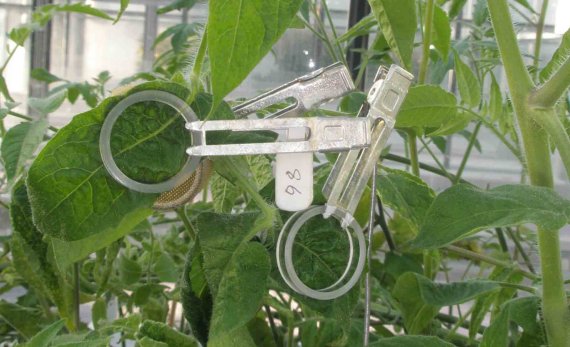*F***irdaus collected 53 wild members of the tomato family, originating in different parts of the world.* They included a wild tomato that is found on the Galapagos Islands. He exposed these 53 varieties to whitefly, which despite the name is actually a kind of louse. Whiteflies not only damage tomatoes, they also spread a lot of dangerous viruses. Whitefly can be controlled quite effectively in greenhouses by introducing their natural enemies. However, they are a global problem for crops in open fields, where insecticides are still the only effective control method. When the whiteflies were brought into contact with the Galapagos tomatoes in mini clamp-cages, that was the end of the whiteflies. ‘We were lucky’, says researcher Sjaak van Heusden. ‘You don’t often see such a strong reaction.’ Firdaus then crossed the Galapagos tomato with a Dutch variety to localize the genes responsible for the resistance. The offspring were tested for resistance. The Wageningen plant breeders were able to target their search for the genetic factor for resistance to whitefly as they already had a lot of markers on the tomato genome. They found two DNA sections in the Galapagos tomato that protect the tomato. The most promising section contains 356 genes. Plant Breeding wants to narrow down the position and function of the resistance genes even further but the breeding companies Enza, EastWest and Ewindo – partners in the research project – are already satisfied with this result. Now they are able to incorporate this property by crossing it into their own varieties. Fortunately the Galapagos tomato is closely related to commercial varieties, which makes cross-breeding easy. As part of his PhD research, Firdaus also looked for resistance to whitefly in chilli pepper plants. He tested 44 different peppers but he eventually abandoned this line of research as he found no significant evidence of resistance in these peppers. So these crops will still have to rely on spraying for protection against the persistent whitefly. Syarifin Firdaus will be receiving his PhD on 12 September; his supervisor is Richard Visser, professor of Plant Breeding.*
Tomatoes will soon be resistant to whitefly
In two years' time, tomatoes will be resistant to whitefly, a persistent louse that also damages other vegetables. That is thanks to PhD student Syarifin Firdaus, who discovered two genes giving resistance to the louse.

